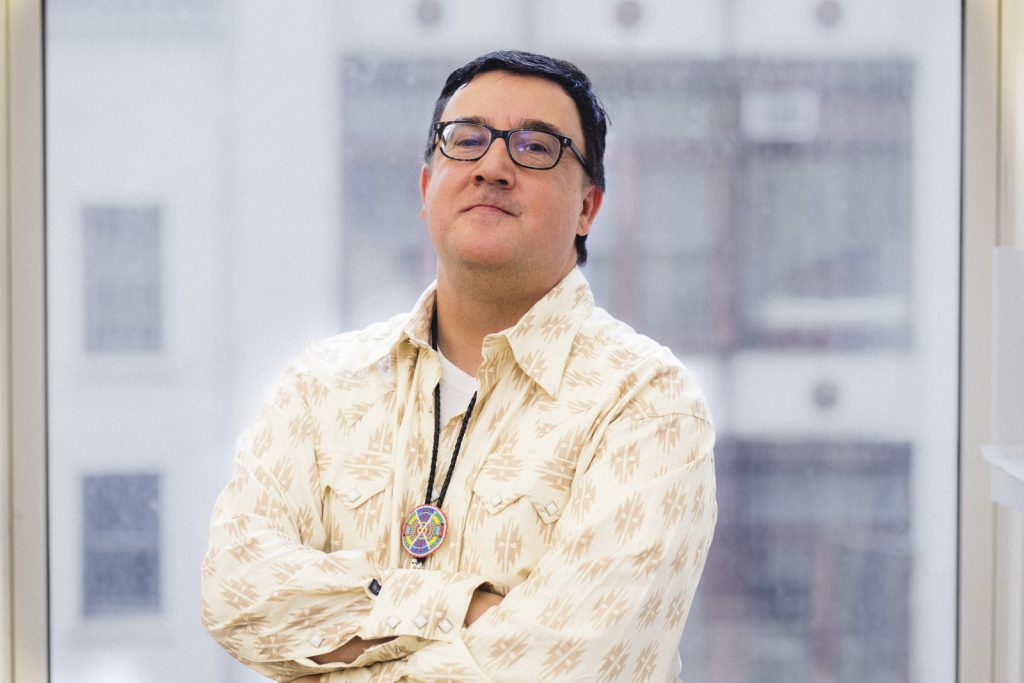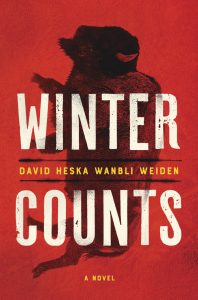David Heska Wanbli Weiden Sets a Mystery on the Reservation in ‘Winter Counts’

With his debut novel, Winter Counts, David Heska Wanbli Weiden, PhD ’07, became one of just a handful of Native American writers ever nominated for an Edgar Award, the highest honor in the world of mystery fiction.
Published in 2020, the back cover of the book features rave reviews from, among others, Tommy Orange and Stephen Graham Jones, two leading authors in the new wave of Native American writing that spans both genre and literary fiction.
Weiden, an enrolled citizen of the Rosebud Sioux Tribe and a former attorney who teaches Native American studies at Metropolitan State University of Denver, themed his book around the 1885 Major Crimes Act, which places felony crimes committed on a Native reservation under federal jurisdiction. His protagonist, Virgil Wounded Horse, is a vigilante trying to catch heroin dealers bringing drugs onto Native land.
The Alcalde talked to Weiden about his journey to writing, his tribe, and the universal appeal of a good mystery.
When did you start writing this novel?
2017. I’d written a short story, also titled “Winter Counts,” in 2011, and published it in 2014, and the hero of that piece, Virgil Wounded Horse, is killed at the end. But as the years passed, I felt this was such a great character that I’d created, and I just hadn’t done enough with him. I felt very intimidated by writing in the long form—I honestly didn’t know if I had the chops to write a novel—but 2017 rolled around, and I decided that maybe now is the time. I made a commitment to get up every morning at 4 a.m. before my kids are up and write for two hours a day, which is what I did for 18 months to complete that novel and revise it.

Was the plot inspired by your real life or anything you had encountered in your teaching career?
I teach Native American studies, so I’ve been aware for a long time of some of the issues that befall Native reservations in America: criminal justice, health care issues, food issues. The plot of Winter Counts deals with the Major Crimes Act, which is a law that says Native nations may not prosecute felony crimes that occur on their own lands. So maybe there’s a person who commits a felony crime on a reservation and the tribal police catch him—the tribal police are then obligated to contact the FBI and the U.S. Attorney’s office and refer the case to them. That’s problematic in and of itself, given that Native nations are sovereign and independent nations, but it’s made even worse by the fact that federal authorities are declining to prosecute about 30 percent of these felony cases. And if the feds decline the case, the person is set free. This is, of course, outrageous, and if you’re a person whose child has been harmed and the feds won’t do anything, you want some justice. So, there is a class of hired vigilantes who will go and beat the tar out of someone on a Native reservation for a price. Virgil’s price is $100 for each bone he breaks, and $100 for each tooth he knocks out.
Did you make a deliberate choice to write in this genre?
I’ve always loved crime fiction. Whether you call it mystery fiction, suspense, or whatever, I’ve loved it ever since I was a kid, in all variants. I used to read a lot of Agatha Christie; as a kid, I loved James Bond novels; I love Martin Cruz Smith’s books. I never read some of the classic works of crime fiction such as Raymond Chandler and others until graduate school. During my MFA days, I had a mentor who was a crime novelist, and he said, “You need to read the classics.” He assigned me a diet of the classic crime novels, including some of the best crime noir novels. And I was blown away and embarrassed that I had never read those. The great Jim Thompson, Chandler, Richard Price—I could go on and on. My already existing love for crime fiction became even deeper when I realized I had neglected some of the great books.
I think crime fiction can often get at greater truths in a more direct way than literary fiction can. Would you agree?
That’s really what drew me to it. The crime fiction I like best is crime fiction that has something of the social novel to it. Crime fiction that comments on inequities in society can really illustrate some of these problems of social justice and racial justice that in ways maybe other genres cannot. I love what’s often called literary fiction—I love Updike, Raymond Carver—but crime fiction, I love that it marries great stories, great characters, and some commentary into American society. It’s the genre I love to read, and the one I love to write in as well.
Native American author Tommy Orange, who made waves in 2019 with his novel There There, blurbed Winter Counts. Do you feel like there’s some momentum behind Native American literature right now?
Very much so. A lot of literary scholars who study this have said that right now we’re in the middle of what’s called the fourth wave of Native literature. There have been several waves in the past, starting in the 1960s, when you had the first great group of Native writers—James Welch and so many others, they started writing, and then there was another wave. It’s been argued that we’re now in the fourth wave, where Native folks are writing not just standard literary fiction but branching into genre. My friend Stephen Graham Jones is writing indigenous horror; there are a number of indigenous science fiction writers. There’s absolutely a new movement and energy of Native writers right now, and I’m happy to be included in that group, if indeed I am.
Photograph by Aslan Chalom; book image courtesy of Ecco Press














No comments
Be the first one to leave a comment.